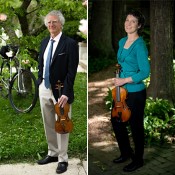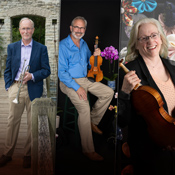
MSO Retiree Spotlight: Robert Levine and Beth Giacobassi
David Lewellen
PUBLISHED
Tagged Under: 2024.25 Season, Bassoon, MSO Musicians, Viola
Two retiring MSO musicians will take with them a combined 81 years of institutional memory when they play their last concert in June. But bassoonist Beth Giacobassi and principal viola Robert Levine joined the symphony at very different points in their careers.
Giacobassi came to the orchestra in 1982 at age 22, straight out of college, and will be retiring close to her 65th birthday, after 43 years with the same employer. “Going from undergraduate to that kind of position was very overwhelming,” she remembered. “I had to learn two or three programs a week, I didn’t know the repertoire, most of the orchestra was older, and there weren’t many women.”
But as time went on, she got married, had three kids, took innumerable tours locally and abroad, and taught generations of students at UWM. Her husband, Mike, a former MSO violinist, retired three years ago, but Beth wasn’t ready then. “Now it’s time,” she said. Arthritis in her fingers is making it more difficult to play, and she has other projects waiting.
For her entire career, Giacobassi has played third bassoon, doubling on the enormous, even lower-pitched contrabassoon. “It is quite different from the bassoon,” she said. “I’ll play the Bach cello suites on it, and it’s similar to a double bass.”
She always required her bassoon students to spend some time learning contrabassoon, for a very practical reason: “Most of the gigs out there require contra.” If a small regional orchestra has two bassoons on the roster and needs to hire a third for one concert, chances are the part will also involve playing contra.
Probably her most noted bassoon student at UWM, however, is now making a name as a singer — soprano Kathryn Henry, who recently performed in Carmen with the Florentine Opera. “I feel like a second mom to her — as I did for all my students,” Giacobassi said. She was amazed to hear Henry sing for the first time, and when it came time to choose, she advised her to pursue voice over bassoon.
In retirement, she will spend more time visiting her adult children and helping with her two grandchildren. She’ll also be making more visits with her therapy dogs to Sojourner House and the Milwaukee Women’s Correctional Center, and continuing to compose lullabies on her own after being a teaching artist with the MSO’s Lullaby Project.
Unlike Giacobassi, Robert Levine arrived at the MSO in 1987 at age 35 with plenty of experience in quartets and chamber orchestras. But even so, a lot of the big symphonic repertoire was new to him. “But I was ready for it,” he added. “I was able to appreciate where I was. The standards were high, but it was always a nice group of people.”
And it has stayed that way over his 38 years in Milwaukee, he said. He doesn’t claim to know the secret, “but people have gotten along, and they’ve been willing to work.” In the viola section in particular, he said, “everyone has bought in and contributed. It attracts a certain personality that likes to play with others. Violists for the most part don’t pick their instrument because they want to be soloists.”
As well as playing in the MSO, Levine has been the president of the local chapter of the American Federation of Musicians for 25 years and has been working this spring on the team to negotiate the next union contract with the symphony.
Thinking back over highlights, he comes up with many — the way Zdeněk Mácal led Dvořák, Andreas Delfs’s recording of Hansel and Gretel that left him a little teary, the Mozart operas under Edo de Waart (“He just worked hard on the right things”), and Elijah under Ken-David Masur (“I’ve always loved Ken’s Mendelssohn”).
One retirement project for Levine will be working to digitize the MSO’s vast archive of analog recordings, covering everything before 1987. “It’s a perfect project — I go to the hall and sit and listen to music,” he said. “It’s a real-time process. You can’t speed it up.” He will also spend more time on Lake Michigan; he is an enthusiastic sailor and the vice president of the Milwaukee Community Sailing Center.
Both retiring musicians said they were glad they got a chance to play a few years in the Bradley Symphony Center. Giacobassi remembered the first sound check in 2021, and “I heard things I’d never heard before. It’s very exciting to have our own home.”
“Life in the new hall is so much more pleasant,” Levine said. “We have a couch, we have a green room for treats and socializing. People get their lunch and eat in the atrium and talk. The experience of coming to work every day has been transformed.” But no matter where the orchestra plays, “I was lucky to end up here. It’s a good place. The culture has never been adversarial, and people don’t realize how good this orchestra can sound.”
“I’m really grateful to have had my whole career here,” Giacobassi said. “Milwaukee’s a great city, and we’re lucky to have community support. We do heal people’s souls. Even if you’re not a professional musician, music helps anyone at any level.”



